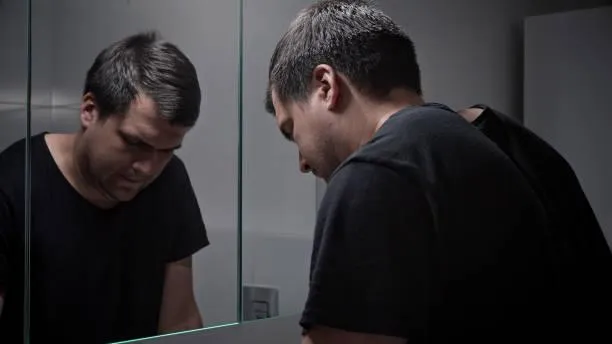
The Anvil | Issue #091525
The Faults Within | The Most Dangerous Lie You Tell Yourself Every Day
Look Closer...
The mirror doesn't lie, but we've become experts at not looking.
A couple of months ago, I was having coffee with a friend who was complaining—again—about his failing marriage. Same conversation we'd had several times in the past year. His wife doesn't appreciate him. She's always critical. She never acknowledges what he does right. It's never good enough. The list went on, as familiar as a worn out record.
"Have you considered the fact that you may not be actually giving her what she needs from you?"
I interjected respectfully.
He looked at me like I'd suggested he was 'stupid'. "of course I am... I'm doing everything I can. I pay the bills, I put the roof over our heads, anything she needs, I make sure she has..."
And there it was...
The most dangerous sentence someone can verbalize: "I'm doing everything I can."
Because in that moment, my friend revealed something he couldn't see about himself: he had become completely blind to his own contribution to the problem. In his mind, he was the hero of his own story, blameless and misunderstood. Every relationship struggle, every repeated conflict, every pattern of dysfunction—none of it traced back to him.
Thomas Carlyle said it best.... "The greatest fault is to be conscious of none."
Think about that for a moment. Not having faults isn't the problem—we all have them.
The problem is living in such complete denial of them that we become unteachable, unchangeable, stuck in the same destructive patterns while wondering why life keeps happening to us instead of for us.
Here's what I've noticed about people who remain perpetually stuck: they've perfected the art of external blame. The economy is bad. Their spouse is difficult. Their boss is unreasonable. Their kids are ungrateful. Their friends are unsupportive. Their community is judgmental. Their circumstances are impossible.
And here's what I've noticed about people who break through to extraordinary lives: they've developed an almost supernatural ability to turn the lens inward first. Not in self-hatred or toxic shame, but in honest self-examination that asks,
"What role am I playing in creating the very results I claim I don't want?"
This isn't about becoming your own worst critic. This is about becoming your own most honest evaluator.
Because the brutal truth is this: if you can't see your faults, you can't fix them. If you can't own your patterns, you can't change them. If you can't acknowledge your blind spots, you'll keep walking into the same walls while blaming the architect.
I learned this the hardest way possible.
Years ago, I was convinced everyone around me was the problem. My career kept falling apart, deeper and deeper with each attempt to climb—obviously because I kept choosing the wrong path. My friendships felt shallow—clearly because people today don't value real connection. My family relationships felt distant—probably because their they didn't have the same ambitions as I did and would settle for mediocre lives.
Notice the pattern? Every problem had an external cause. Every failure had someone else's fingerprints on it. Every disappointment was proof that the world was broken, not me.
Then a friend of mine said something that shattered my carefully constructed reality: "you've told me about the people who 'betrayed' you, friends who 'let you down,' and countless people who 'don't get it.' When does it become worth considering that maybe the common denominator isn't them?"
I wanted to shut it down. I wanted to defend myself. I wanted to explain how they were missing the point.
But late that night and into the early morning, alone with my thoughts and my pride bruised, I started asking a different question: "What if they are right? What if I'm the common denominator in all these failed sectors of my life? What if my faults are so obvious to everyone except me?"
That question cracked opened a door I'd been keeping tightly locked for years.
I started seeing things I'd been blind to. How I dominated conversations instead of listening. How I made everything about me. How I promised big and delivered small. How I blamed circumstances instead of taking responsibility. How I expected others to change while refusing to examine my own behavior.
The faults weren't hidden—I'd just become an expert at not seeing them.
Here's what's terrifying about self-awareness: once you start seeing your patterns, you can't unsee them. That tendency to interrupt people mid-sentence because you think you know where they're going.
That habit of making excuses when you're late instead of just apologizing. That pattern of giving advice when people just want to be heard. That way you withdraw when things get difficult instead of leaning into hard conversations.
But here's what's liberating about self-awareness: once you can see your faults clearly, you finally have the power to do something about them.
The person who says "I don't have any real faults" is trapped in a prison of their own making. They'll repeat the same mistakes, blame the same people, and wonder why their life feels like Groundhog Day.
The person who says "I have faults, and I'm committed to seeing them clearly" has just unlocked the door to unlimited growth. Because awareness is the first step to transformation.
Right now, someone in your life knows exactly what your biggest fault is. They've probably tried to tell you, directly or indirectly. You've probably dismissed them, defended yourself, or written them off as being too critical, or 'just not getting it'.
What if they're not too critical? What if they're the only ones brave enough to hold up the mirror you've been avoiding?
If your open to it, I'd like to present a challenge for you this week...
Find someone who knows you well and loves you enough to tell you the truth. Ask them this question: "What's one pattern or behavior you see in me that I might be blind to? Something that, if I could see it clearly, would help me grow?"
Then—and this is the hardest part—listen without defending. Don't explain. Don't justify. Don't minimize. Just listen and say, "Thank you for caring enough to be honest with me."
You might not like what you hear. In fact, you probably won't. But that discomfort is the price of admission to a life of continuous growth instead of perpetual stagnation.
The greatest fault isn't being imperfect. We're all imperfect. The greatest fault is being so unconscious of our imperfections that we become impossible to help, impossible to teach, and impossible to love deeply.
The mirror is waiting. The question isn't whether you have faults—we all do. The question is whether you have the courage to see them clearly enough to do something about them.
Because on the other side of that uncomfortable mirror lives the person you've always had the potential to become.
Your Spiritual Blacksmith,
Myriac | The Undeniable Man™
P.S. - That friend with the marriage problems? He had 'the chat' with his wife recently... Turns out, she didn't need him to do more—she needed him to listen more...'JUST Listen and stop trying to FIX everything' as it was said. It had nothing to do with him being the perfect provider and having solutions for everything, it was about connecting, empathizing with genuine understanding and meaningful love. Sometimes the solution isn't adding something new or finding 'the hack'. Sometimes it's seeing something that was always there and giving it the right attention.

